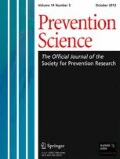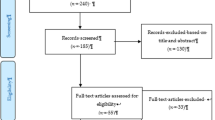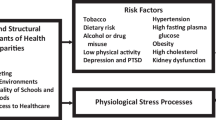Abstract
Progress in identifying effective programs and policies for preventing tobacco, alcohol, and illicit drug use has stimulated a growing sense of optimism about the potential of prevention science and practice. This paper summarizes some of the key challenges and critical issues that still need to be addressed for the advances of the past two decades of prevention research to have an impact on the nature of prevention practice and eventually translate into reductions in mortality and morbidity. In addition to identifying effective strategies for disseminating the use of evidence-based prevention programs and policies, issues related to implementation fidelity and adaptation need to be better understood as well as factors associated with institutionalization of effective prevention programs. Further advances in prevention science and practice will require a new emphasis on blended research models that involve conducting prevention research in practice settings with the active collaboration of researchers and practitioners.
Similar content being viewed by others
REFERENCES
Biglan, A. (2004). Contextualism and the development of effective prevention practices. Prevention Science, 5, 15-21.
Castro, F. G., Barrera, M., Jr., & Martinez, C. R. (2004). The cultural adaptation of prevention interventions: Resolving tensions between fidelity and fit. Prevention Science, 5, 41-45.
Dusenbury, L., & Hansen, W. B. (2004). Pursuing the course from research to practice. Prevention Science, 5, 55-59.
Elliott, D. S., & Mihalic, S. (2004). Issues in disseminating and replicating effective prevention programs. Prevention Science, 5, 47-53.
Gottfredson, D. C., & Gottfredson, G. D. (2002). Quality of school-based prevention programs: Results from a national survey. Journal of Research on Crime and Delinquency, 39, 3-35.
Greenberg, M. T. (2004). Current and future challenges in school-based prevention: The researcher perspective. Prevention Science, 5, 5-13.
Pentz, M. A. (2004). Form follows function: Designs for prevention effectiveness and diffussion research. Prevention Science, 5, 23-29.
Ringwalt, C. L., Ennett, S., Vincus, A., Thorne, J., Rohrbach, L. A., & Simmons-Rudolph, A. (2002). The prevalence of effective substance use prevention curricula in U.S. middle schools. Prevention Science, 3, 257-265.
Ringwalt, C. L., Vincus, A., Ennett, S., Johnson, R., & Rohrbach, R. L. (2004). Reasons for teachers' adaptation of substance use prevention curricula in schools with Non-White student population. Prevention Science, 5, 61-67.
Rogers, E. M. (1995). Diffusion of Innovations, The Free Press, New York.
Spoth, R., Greenberg, M., Bierman, K., & Redmond, C. (2004). PROSPER community–university partnership model for public education systems: Capacity-building for evidence-based, competence-building prevention. Prevention Science, 5, 31-39.
Author information
Authors and Affiliations
Rights and permissions
About this article
Cite this article
Botvin, G.J. Advancing Prevention Science and Practice: Challenges, Critical Issues, and Future Directions. Prev Sci 5, 69–72 (2004). https://doi.org/10.1023/B:PREV.0000013984.83251.8b
Issue Date:
DOI: https://doi.org/10.1023/B:PREV.0000013984.83251.8b




